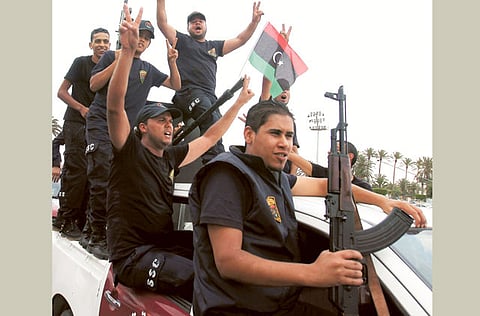Libya splitting into militia zones
Benzhazi, Misrata and Zintan shake off Tripoli’s power

Misrata Libya National flags from around the world flutter in the bright sunshine by a city gate made of shipping containers painted in the Libyan national colours. A uniformed militiaman examines my passport, then waves me through with a smile. Welcome to the Republic of Misrata.
Libya’s third largest city, recipient of a six-month pummelling during last year’s revolution against the regime of Muammar Gaddafi, has transformed itself into what is an independent state in all but name. Libya is due to hold national elections in 10 days, but these look like they may be delayed as any sense of post-Gaddafi national unity dissipated long ago.
Misrata is divorced from the new government, which it views as secretive, dictatorial and heavy-handed, and, as a city with a long tradition of trading, is going its own way. Shops and restaurants are being fixed up, business is brisk, and there is enough traffic on the pockmarked streets to create honking traffic jams.
Qasr Ahmad, Libya’s biggest container port, is the jewel in the city’s crown. The harbour that once spouted the geysers of incoming rockets is now jammed with shipping, and I get a tour in the only tug in Libya that can do something complicated with its engines that allows it to move sideways. The port authority has decided to run the place without reference to central government, which means that the port is open 24 hours a day, and also means that Misrata gets to keep the tugboat.
“In the old days there would be 12 forms and it would take 10 days to pay all the bribes,” says Nasser Mokhtar, who printed photographs of the martyrs in the war in his print shop and is now back at his clothing import business.
Now, he explains, there are no bribes; customs officers fear the wrath of the port authority if they try it on.
Misrata held its own city elections in February, the first anywhere in Libya for four decades, and the new council is now busy organising the police, army, education and health services.
And that is the problem. The price of this success has been a divorce from a central government. “We don’t want to be independent, we want Libya to be like us,” says Farouk Ben Amin, a former rebel fighter now working in the family import business.
It’s not just Misrata. From all points of the compass, revolt, even revolution, is in the air as Libya’s former rebel towns go their own way.
More than 170 kilometres from Misrata is Zintan, a humble metropolis nestling in the cool foothills of the jagged Jabal Nafusa mountains.
In the war, Zintan’s rebels were one half of the pincer movement, Misrata was the other that captured Tripoli. Its units poured out of the mountains and into the west of the city, while Misrata’s units punched in from the east. Now the mood in both cities is suspicious about the ruling National Transitional Council
Zintan’s uneasiness has seen it change its mind about handing over Libya’s top war crimes suspect, Saif Al Gaddafi, son of the late dictator, who continues to languish in a fortified villa on the edge of town. “It is safer to hold his trial here; the government is very weak, they can’t control their country,” said Attaher Eturki, the ever-smiling city council leader, his crisp English a product of a degree in engineering in Leicester a couple of years ago. “We have good security here.”
To the south, meanwhile, battles between the Tibu, a people who inhabit a large stretch of the Sahara, and Arab tribes have left 200 dead and the towns divided into war zones.
The most serious challenge to central authority is Benghazi, where the revolution began in February last year. Like Misrata, Benghazi held its own elections earlier this year, and like Misrata the city council is busy assuming powers for itself at the expense of central government.
Some in the city want to go further. Benghazi is the capital of Cyrenaica, which with the regions of Tripolitania and Fezzan make up Libya, and many citizens are unhappy that the province gets only 60 of the 200 seats in the national elections. A self-proclaimed Council of Barqa, the Arab name for Cyrenaica, is urging a boycott of the national elections, postponed to next month unless it gets a bigger slice of seats.
Sign up for the Daily Briefing
Get the latest news and updates straight to your inbox


